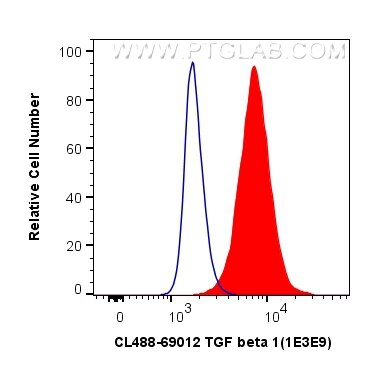TGF beta 1 Monoklonaler Antikörper
TGF beta 1 Monoklonal Antikörper für FC (Intra)
Wirt / Isotyp
Maus / IgG1
Getestete Reaktivität
human
Anwendung
FC (Intra)
Konjugation
CoraLite® Plus 488 Fluorescent Dye
CloneNo.
1E3E9
Kat-Nr. : CL488-69012
Synonyme
Galerie der Validierungsdaten
Geprüfte Anwendungen
| Erfolgreiche Detektion in FC | HEK-293-Zellen |
Empfohlene Verdünnung
| Anwendung | Verdünnung |
|---|---|
| Durchflusszytometrie (FC) | FC : 0.80 ug per 10^6 cells in a 100 µl suspension |
| It is recommended that this reagent should be titrated in each testing system to obtain optimal results. | |
| Sample-dependent, check data in validation data gallery | |
Produktinformation
CL488-69012 bindet in FC (Intra) TGF beta 1 und zeigt Reaktivität mit human
| Getestete Reaktivität | human |
| Wirt / Isotyp | Maus / IgG1 |
| Klonalität | Monoklonal |
| Typ | Antikörper |
| Immunogen | TGF beta 1 fusion protein HZ-1011 |
| Vollständiger Name | transforming growth factor, beta 1 |
| Gene symbol | TGFB1 |
| Gene ID (NCBI) | 7040 |
| Konjugation | CoraLite® Plus 488 Fluorescent Dye |
| Excitation/Emission maxima wavelengths | 493 nm / 522 nm |
| Form | Liquid |
| Reinigungsmethode | Protein-G-Reinigung |
| Lagerungspuffer | BS mit 50% Glyzerin, 0,05% Proclin300, 0,5% BSA, pH 7,3. |
| Lagerungsbedingungen | Bei -20°C lagern. Vor Licht schützen. Nach dem Versand ein Jahr stabil. Aliquotieren ist bei -20oC Lagerung nicht notwendig. 20ul Größen enthalten 0,1% BSA. |
Hintergrundinformationen
TGFB, also named as LAP and TGFB1, is a multifunctional peptide that controls proliferation, differentiation, and other functions in many cell types. TGFB acts synergistically with TGFA in inducing transformation. It also acts as a negative autocrine growth factor. Dysregulation of TGFB activation and signaling may result in apoptosis. Many cells synthesize TGFB and almost all of them have specific receptors for it. TGFB positively and negatively regulates many other growth factors. It plays an important role in bone remodeling as it is a potent stimulator of osteoblastic bone formation, causing chemotaxis, proliferation and differentiation in committed osteoblasts. It is highly expressed in bone. Mutation of TGFB are the cause of Camurati-Engelmann disease (CED) which known as progressive diaphyseal dysplasia 1 (DPD1).
Protokolle
| Produktspezifische Protokolle | |
|---|---|
| FC protocol for CL Plus 488 TGF beta 1 antibody CL488-69012 | Protokoll herunterladen |
| Standard-Protokolle | |
|---|---|
| Klicken Sie hier, um unsere Standardprotokolle anzuzeigen |


